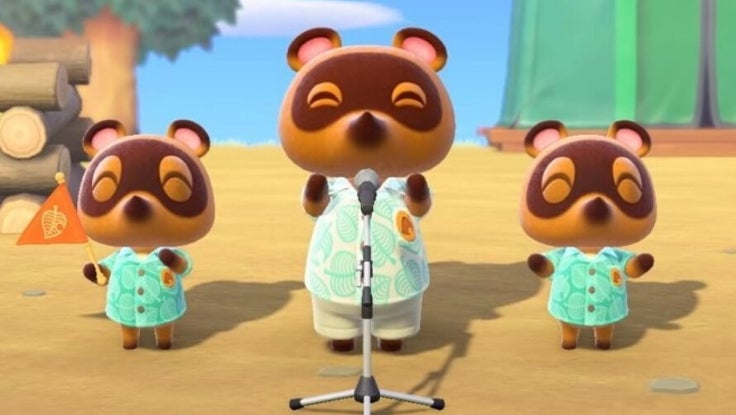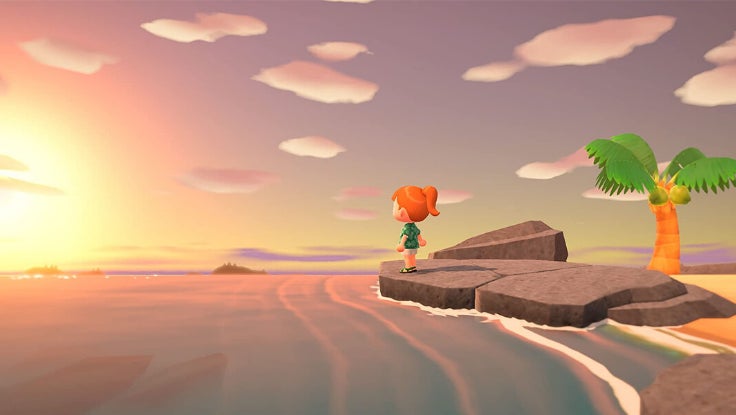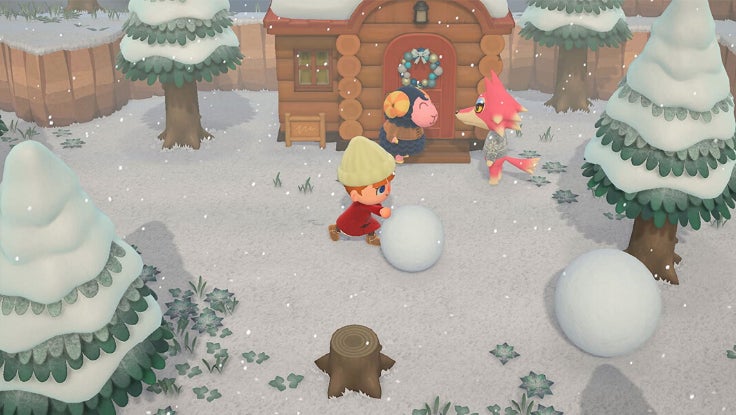The Meteoric Success of Animal Crossing: Everything You Need to Know About the Success of Shelter in Place by Nintendo
The Meteoric Success of Animal Crossing: Everything You Need to Know About the Success of Shelter in Place by Nintendo

If you've been paying attention to social media even a little over the past month, you've probably heard about Animal Crossing: New Horizons, which was released for the Nintendo Switch on March 20. Although New Horizons marks the fifth entry in the long Animal Crossing series, it may be the first time you hear about it, unless you are (or know) a player. The ongoing covid-19 pandemic, which has forced people around the world to take shelter locally and physically distance themselves from family and friends, seems to have strangely set the perfect stage for New Horizons to take the world by storm.
The game offers a calming escape - and the opportunity to virtually go out with your friends. At an unprecedented time like this, these offers are not to be underestimated: New Horizons sold 5 million digital copies in its first month, breaking console game records for most month-long sales. Production shutdowns and global supply chain problems have affected most industries and many products, and the Nintendo Switch is no exception.
Animal Crossing contributes to the worldwide shortage of Nintendo Switch
However, higher-than-expected demand for New Horizons, in pairs with these other problems caused by COVID-19, led to a global shortage of Nintendo's main console in the last month. (In addition, this Virginia-based teenager may have had something to do with it; he created an automated shopping bot that allows shoppers to bypass the checkout process and pick up consoles.) The Switch, which allows the player play anywhere, as a portable device, and on TV, as a standard game console (hence the smart name), it's sold out everywhere.

Before we get to New Horizons, let's take a step back and revisit the early 2000s. At that time, Nintendo's home console was the GameCube, and its first-year hits included names like Super Smash Bros. Melee, Luigi's Mansion and Tony Hawk's Pro Skater 3. But a small game called Animal Crossing hit the shelves in September 2002, just a year after the GameCube was released - and a year and a half after its debut on the Nintendo 64 only in Japan One of the best-selling gamecube games of all time, Animal Crossing was also a hit with critics.
So, what does the player really do when crossing animals?
In the social simulation game, the player's character is a human who moves to a distant village inhabited by several anthropomorphic animals. One such animal is Tom Nook, a raccoon salesman with an eye for business. Nook provides the player with a house - but it comes at a high price. To pay the debt, the player must explore the village and fish, sell insects, hunt for fossils and so on in order to accumulate Bells, the local currency.
Once that debt is paid, Nook uses the money not only to upgrade his home, but also to expand his own business. And so the almost endless cycle of debt continues. The game also used the GameCube's internal clock and calendar to simulate a real time lapse. Start the game at night and the village will be dark with the villagers getting ready for some closed eyes; play the game at Christmas, and you will be greeted with snow and gifts.
Let's go back: for non-players, this whole concept of "paying off your debt" may not seem relaxing. (To be fair, Nook was much more, well, ominous sounding in the original game.) But New Horizons takes these long-standing elements and infuses them with a little more chill. In it, the player's customizable character moves to a desert island after purchasing a Tom Nook package. Playing in real time, the player can explore the island - and venture to others - to gather and make items and furniture, catch insects and fish and hunt for fossils.

Players can also collect furniture and clothing; plant flowers and cultivate fruit trees; clothing design patterns; contribute animal finds to a local museum; attract more animal residents and business owners to their islands; selling turnips in what has been dubbed the "stalk market"; participate in fun events (you may have heard about Rabbit Day, for example); and help nook develop its small island communities in flourishing. Sure, you still have to pay your debt every time you remodel your home or add infrastructure to your island, but as a nook loyalist, you also collect miles (as reward points) and work with Nook to make the island a real destination.
Living the Simple Life and Building Community
Better yet, even if you're isolated, you don't have to play New Horizons in isolation. Players have the opportunity to invite friends and other players to their islands or visit distant locations. Translation: If you are confined to your home, you can get your day-to-day fix here. You can be social in a virtual way, share items with your friends and just explore.
During global shelter orders, we cannot travel, go out with friends. Even day-to-day things, like taking a walk and stopping at the store, are complicated by the risks of COVID-19. New Horizons offers the simple life from the safety and comfort of your sofa - that's what makes it so attractive. It is easy to spend time in the game, to get lost in the small side tasks where you have to collect certain items or help a villager colleague in need.
Simply put, Animal Crossing is escapism at its best: players are able to live a virtual life in a new place and socialize with adorable animals and their friends. Although there are debts, it seems manageable. The non-linear nature of the gameplay allows you to unlock new areas of your island, or new customization options, at your own pace. Because everything seems to be on your terms, it is easy to feel fulfilled and, during a time when we are all a little aimless and anxious, this feeling is hard to find. This is perhaps one of the most attractive features of Animal Crossing: In a world where everything seems uncertain and out of our hands, New Horizons gives us a little bit of control back.
By ask & Nitendo

If you've been paying attention to social media even a little over the past month, you've probably heard about Animal Crossing: New Horizons, which was released for the Nintendo Switch on March 20. Although New Horizons marks the fifth entry in the long Animal Crossing series, it may be the first time you hear about it, unless you are (or know) a player. The ongoing covid-19 pandemic, which has forced people around the world to take shelter locally and physically distance themselves from family and friends, seems to have strangely set the perfect stage for New Horizons to take the world by storm.
The game offers a calming escape - and the opportunity to virtually go out with your friends. At an unprecedented time like this, these offers are not to be underestimated: New Horizons sold 5 million digital copies in its first month, breaking console game records for most month-long sales. Production shutdowns and global supply chain problems have affected most industries and many products, and the Nintendo Switch is no exception.
Animal Crossing contributes to the worldwide shortage of Nintendo Switch
However, higher-than-expected demand for New Horizons, in pairs with these other problems caused by COVID-19, led to a global shortage of Nintendo's main console in the last month. (In addition, this Virginia-based teenager may have had something to do with it; he created an automated shopping bot that allows shoppers to bypass the checkout process and pick up consoles.) The Switch, which allows the player play anywhere, as a portable device, and on TV, as a standard game console (hence the smart name), it's sold out everywhere.

Before we get to New Horizons, let's take a step back and revisit the early 2000s. At that time, Nintendo's home console was the GameCube, and its first-year hits included names like Super Smash Bros. Melee, Luigi's Mansion and Tony Hawk's Pro Skater 3. But a small game called Animal Crossing hit the shelves in September 2002, just a year after the GameCube was released - and a year and a half after its debut on the Nintendo 64 only in Japan One of the best-selling gamecube games of all time, Animal Crossing was also a hit with critics.
So, what does the player really do when crossing animals?
In the social simulation game, the player's character is a human who moves to a distant village inhabited by several anthropomorphic animals. One such animal is Tom Nook, a raccoon salesman with an eye for business. Nook provides the player with a house - but it comes at a high price. To pay the debt, the player must explore the village and fish, sell insects, hunt for fossils and so on in order to accumulate Bells, the local currency.
Once that debt is paid, Nook uses the money not only to upgrade his home, but also to expand his own business. And so the almost endless cycle of debt continues. The game also used the GameCube's internal clock and calendar to simulate a real time lapse. Start the game at night and the village will be dark with the villagers getting ready for some closed eyes; play the game at Christmas, and you will be greeted with snow and gifts.
Let's go back: for non-players, this whole concept of "paying off your debt" may not seem relaxing. (To be fair, Nook was much more, well, ominous sounding in the original game.) But New Horizons takes these long-standing elements and infuses them with a little more chill. In it, the player's customizable character moves to a desert island after purchasing a Tom Nook package. Playing in real time, the player can explore the island - and venture to others - to gather and make items and furniture, catch insects and fish and hunt for fossils.

Players can also collect furniture and clothing; plant flowers and cultivate fruit trees; clothing design patterns; contribute animal finds to a local museum; attract more animal residents and business owners to their islands; selling turnips in what has been dubbed the "stalk market"; participate in fun events (you may have heard about Rabbit Day, for example); and help nook develop its small island communities in flourishing. Sure, you still have to pay your debt every time you remodel your home or add infrastructure to your island, but as a nook loyalist, you also collect miles (as reward points) and work with Nook to make the island a real destination.
Living the Simple Life and Building Community
Better yet, even if you're isolated, you don't have to play New Horizons in isolation. Players have the opportunity to invite friends and other players to their islands or visit distant locations. Translation: If you are confined to your home, you can get your day-to-day fix here. You can be social in a virtual way, share items with your friends and just explore.
During global shelter orders, we cannot travel, go out with friends. Even day-to-day things, like taking a walk and stopping at the store, are complicated by the risks of COVID-19. New Horizons offers the simple life from the safety and comfort of your sofa - that's what makes it so attractive. It is easy to spend time in the game, to get lost in the small side tasks where you have to collect certain items or help a villager colleague in need.
Simply put, Animal Crossing is escapism at its best: players are able to live a virtual life in a new place and socialize with adorable animals and their friends. Although there are debts, it seems manageable. The non-linear nature of the gameplay allows you to unlock new areas of your island, or new customization options, at your own pace. Because everything seems to be on your terms, it is easy to feel fulfilled and, during a time when we are all a little aimless and anxious, this feeling is hard to find. This is perhaps one of the most attractive features of Animal Crossing: In a world where everything seems uncertain and out of our hands, New Horizons gives us a little bit of control back.
By ask & Nitendo
Comments
Post a Comment